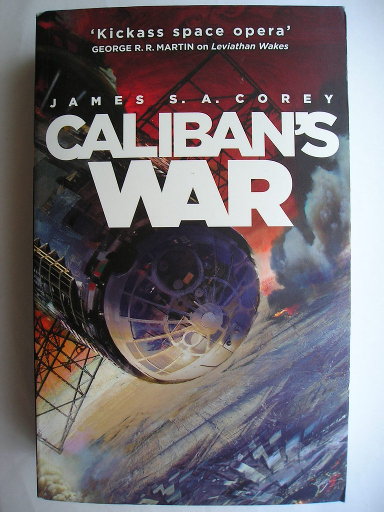
The novel “Caliban’s War” by James S.A. Corey was published for the first time in 2012. It’s the second book in the Expanse series and follows “Leviathan Wakes“.
On Ganymede there’s a tense truce between the United Nations and Mars but a battle breaks out when a monstrous creature kills Marines of both armies in service on Jupiter’s moon. Martian Marine gunnery sergeant Roberta “Bobbie” Draper is the only survivor and must testify about what happened but ends up embroiled in political games which lead her to work for the United Nations Assistant Undersecretary of Executive Administration Chrisjen Avasarala.
Jim Holden and the crew of the former Martian fleet spaceship Rocinante are patrolling a space area on behalf of the Outer Planets Alliance (OPA). When they are alerted that something’s going on Ganymede they go to investigate and find that the situation is plummeting. They meet the botanist Praxidike “Prax” Meng, whose daughter has been kidnapped in strange circumstances and with him they discover that someone conducted experiments with the alien protomolecule.
James S.A. Corey is the pen name of two writers: Daniel Abraham, who on his own writes mostly fantasy, and Ty Franck, who worked as an assistant to George R.R. Martin. Together, they’ve been writing the stories of the Expanse series, a space opera set in a future where humanity has colonized part of the solar system.
“Caliban’s War” begins some time after the end of “Leviathan Wakes”. The story told in the first novel continues so you must have read it to understand who are the crew members of the Rocinante and the many references to previous events. In essence, the second novel is the second part of a larger story.
The threat caused by the alien protomolecule seems averted but something that happens on Ganymede suggests otherwise. However, this time it’s not about human beings turned into kind of zombies that can infect anyone who comes in contact with them but a kind of super-soldier slaughtering two teams of Earth and Martian Marines who are very well trained and very well armed.
The second novel repeats in many ways the plot of the first one masking it with a different tone and different characters the authors tell the stories about. In “Leviathan Wakes” Detective Miller’s story and the events on Eros added to the plot noir and horror tones. In “Caliban’s War” these connotations are missing while there’s a much greater development of the political side.
The different development of the subplots is seen in the fact that in “Caliban’s War” they’re developed by alternating the stories of four different protagonists. From the first novel only Jim Holden remains while there are the new ones about the Martian Marine Roberta “Bobbie” Draper, the UN Assistant Undersecretary of Executive Administration Chrisjen Avasarala and Ganymede’s botanist Praxidike “Prax” Meng.
A certain tendency to use clichés in the development of certain parts of the plot that are predictable and especially the characters continues. My impression is that the authors prefer to focus on the action and use these clichés to allow readers to easily understand the characters’ personality, motivations and reactions to the events.
It’s positive that the protagonists from the first novel have a certain evolution, in particular Jim Holden, an idealist ready to make big messes throughout the solar system based on incomplete information. Somehow his past experiences and the influence of Naomi help him at least to limit the damage.
The positive elements from the first novel are also kept in “Caliban’s War” with lots of action and twists in a space opera with very classical connotations. The authors are also good at developing the political intrigue while maintaining the fast pace. There’s a good balance between the plot connected to the tension between Earth and Mars with the factions within the United Nations and the one connected to the events on the Rocinante.
As the first novel, “Caliban’s War” has an ending, even though various story elements are open to its sequels. I think the ending is the weakest part because the authors concentrate in it a series of clichés that gave me a strong been there done that feeling. Again the authors seemed interested mostly in closing the novel avoiding complications to keep the fast pace.
I keep thinking that at least the first two novels of the Expanse series are overrated but I must admit that the authors cleverly disguise the flaws with a fluid narrative that leads the reader to the end without thinking too much. If you’re interested in an enjoyable space opera without too many complications, “Caliban’s War” and the rest of the series are really good.


Permalink